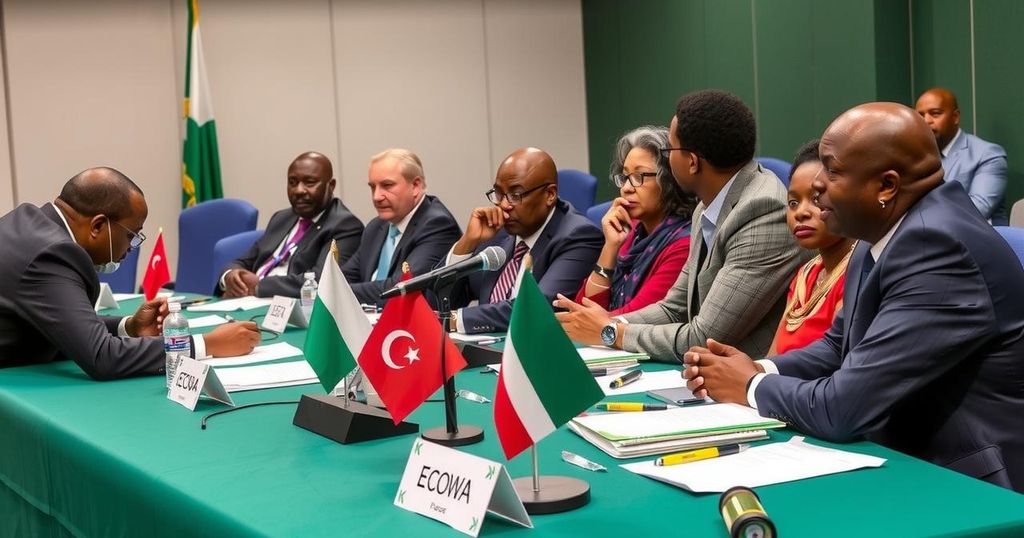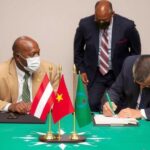Politics
AFRICA, AL QAEDA, ASIA, BASSIROU DIOMAYE FAYE, BURKINA FASO, CHINA, COUP, ECONOMIC COMMUNITY OF WEST AFRICAN STATES, ECONOMIC INTEGRATION, ECOWAS, EUROPE, FA, FAURE GNASSINGBÉ, FAYE, FRANCE, JAPAN, MALI, MILITARY COUP, MOROCCO, NIGER, OMAR TOURAY, REGIONAL AFFAIRS, REGIONAL COOPERATION, SA, SAHEL, SENEGAL, TOGO, WEST AFRICAN
Clara Montgomery
ECOWAS Summit Addresses Departure of Burkina Faso, Mali, and Niger
ECOWAS leaders met to discuss Burkina Faso, Mali, and Niger’s departure from the bloc, led by military governments citing excessive influence from France. This exit, termed “irreversible,” threatens regional integration and security cooperation amidst rising jihadist activity. Mediators, including Senegal’s President, continue to engage with the Sahel states as they prepare for formal withdrawal by January 2024.
West African leaders from the Economic Community of West African States (ECOWAS) convened on Sunday to deliberate on the impending separation of three member states—Burkina Faso, Mali, and Niger—all governed by military regimes. These nations have reiterated their commitment to exit the regional organization, which they originally announced a year prior. They expressed strong dissatisfaction with ECOWAS, alleging excessive influence from France, their former colonial power, and characterized their decision as “irreversible.”
The anticipated withdrawal of these Sahel nations from ECOWAS could have far-reaching implications for regional integration and cooperation. Economic activities, including free trade and the mobility of citizens, as well as collaborative security efforts, may be severely disrupted, especially amidst the rising threats from jihadist factions associated with both Al Qaeda and the Islamic State in the region. The challenge posed by the departure of these states threatens to undermine the stability and coherence of ECOWAS, which has been striving to address escalating security issues in West Africa.
During the summit, Senegal’s President Bassirou Diomaye Faye, who is acting as a mediator in the ongoing discussions, attended and provided an optimistic outlook on the negotiations with the three countries. He highlighted the importance of maintaining relations with these nations, given the security dilemmas present in the region. Additionally, Togo’s President Faure Gnassingbé has played a role in mediating talks with the Sahel countries.
Despite the distressing news regarding the potential exit of Mali, Burkina Faso, and Niger, the ECOWAS Commission President Omar Touray acknowledged the invaluable efforts made in mediation. The formal withdrawal of these three countries from ECOWAS is slated for January 2024, coinciding with the one-year anniversary of their initial declaration, aligning with the procedural regulations of the bloc.
The Economic Community of West African States (ECOWAS) has faced significant challenges in recent years, particularly in relation to political stability and security threats in the Sahel region. Burkina Faso, Mali, and Niger have all experienced military coups, resulting in strained relations with ECOWAS, which is perceived to be under the influence of France. As these three countries prepare to exit ECOWAS, it signals a critical juncture for the regional bloc as it seeks to maintain stability and foster cooperation among its member states in a time of increased insecurity.
In summary, the summit of ECOWAS leaders underscored the serious implications of the proposed withdrawal of Burkina Faso, Mali, and Niger from the organization. Their exit, fueled by discontent over perceived foreign influence and internal governance issues, raises significant concerns regarding regional integration, economic cooperation, and collective security efforts against rising terrorist threats. The ongoing mediation efforts by regional leaders may determine the future dynamics of relations between ECOWAS and the departing nations.
Original Source: menafn.com








Post Comment